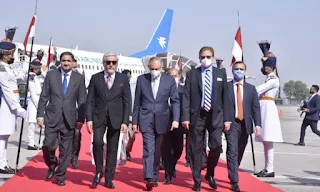Chairman of Afghanistan's High Council for National Reconciliation Dr Abdullah Abdullah arrived in Islamabad on Monday on a three-day official visit.
The Afghan leader is accompanied by a high-level delegation comprising prominent members of the council.
According to the spokesperson for the Ministry of Foreign Affairs, Abdullah will meet Prime Minister Imran Khan, President Dr Arif Alvi, Foreign Minister Shah Mahmood Qureshi, Senate Chairman Sadiq Sanjrani and National Assembly Speaker Asad Qaiser during the trip.
In a tweet shortly after arriving, Abdullah said that he will meet the Pakistani leadership and "exchange views on Afghanistan peace and bilateral relations".
Later, he visited the Foreign Office where he was welcomed by FM Qureshi. The visiting dignitary also planted a sapling at the premises.On Sunday, the Afghan leader had stated that the visit would provide a unique opportunity for the two sides to exchange views on Afghanistan peace talks in Doha and bilateral relations.
"I hope this visit will open a new chapter of mutual cooperation at all levels, especially on achieving a lasting and dignified peace in Afghanistan," he had said on Twitter.
During his visit, Abdullah, will also speak at the Institute of Strategic Studies Islamabad and will also meet journalists. This is the Afghan leader's first visit to Pakistan in his capacity as chairman of the High Council for National Reconciliation.
The visit will provide an opportunity for wide-ranging exchange of views on the Afghan peace process and strengthening of Pakistan-Afghanistan bilateral relations and people-to-people interaction.
Hasty withdrawal from Afghanistan would be unwise: PM Imran
In an op-ed published in The Washington Post on Saturday, Prime Minister Imran Khan warned that a hasty international withdrawal from Afghanistan would be "unwise" and cautioned against setting unrealistic timelines.
The premier said that the path leading to the talks between the Afghan leadership and the Taliban was not easy but "we were able to press on thanks to the courage and flexibility that were on display from all sides".
He pointed out that the United States and its allies had facilitated the prisoner exchange — which the Taliban had linked to resumption of the peace talks — while both the Afghan government and the Taliban had "responded to the Afghan people’s yearning for peace".
The premier said that the intra-Afghan negotiations were "likely to be even more difficult, requiring patience and compromise from all sides".
"Progress could be slow and painstaking; there may even be the occasional deadlock, as Afghans work together for their future. At such times, we would do well to remember that a bloodless deadlock on the negotiating table is infinitely better than a bloody stalemate on the battlefield," he wrote.
He added that all sides who were invested in the Afghan peace process should "resist the temptation for setting unrealistic timelines". He also warned of regional spoilers, who he said saw instability in Afghanistan as an advantage for their own political purposes.
The premier highlighted that it was important to start planning for what would happen in post-war Afghanistan. "How can the world help a post-war Afghanistan transition to sustainable peace? How do we create conditions that will enable the millions of Afghan refugees living in Pakistan, and other countries, to return to their homeland with dignity and honour?"
He assured that Pakistan would continue to support the Afghan peace process. "Like the United States, Pakistan does not want to see Afghanistan become a sanctuary for international terrorism ever again."


